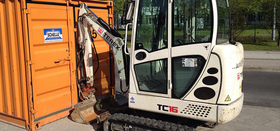Tips For Purchasing a Mini Excavator
Mini or compact excavators are versatile pieces of equipment on any work site. They can get into areas that larger machines can't. They can be used in a wide variety of tasks. They're much easier to haul than the full-size alternatives. And their rubber tracks and lightweight design make less impact on the work site.
If you are considering one of these adaptable machines, use the following checklist to find the appropriate machine for your specific purpose:

1. Buy new: A new mini excavator may cost a little more than a used version, but it typically makes up for it with better features. New excavators have better maintenance options and come equipped with the latest hydraulic technology for the most power and reliable performance. They also have a better variety of attachments and purchasing options. Used excavators can have dubious histories and hidden damage from past construction projects. It is safer and ultimately more effective to choose a new model than to try to make do with a more limited, older version. Costs average $19,000 to $45,000 for a new machine and between $12,000 and $30,000 used, saving you anywhere from 25% to 50%. But you can also plan on paying extra - and more frequently - for maintenance (more on that in a minute).
2. Buy attachments that save time and eliminate additional machines: Modern mini excavators come with a wide selection of options, so you will want to suit your choices to the intended job. Will you be using your excavator primarily for demolition? Then a hydraulic hammer, earth auger, or similar tool may be necessary. Digging holes for landscaping or construction? Then you will need a bucket, but you have to pick the right size. Narrow, 12-inch buckets can dig deep channels, but the broad, 24-inch buckets can quickly create holes and spaces for building construction. For moving debris, shrubbery or even large rocks, a thumb attachment can prove invaluable for the safety and capability it provides.
3. Consider your climate: Today's compact excavator lines have a variety of comfort levels, but your work climate is an important factor. If you have to work in the rain often, consider a model with weatherproofing options such as a fully enclosed operator's seat. If temperatures are uncomfortably high at your sites, consider climate-control options. Seating padding and material are less important but still worthwhile considerations as they impact the operator's productivity throughout a shift.
4. Remember future maintenance: Excavators will get worn and dirty, and must be cleaned regularly, typically after each project, to ensure proper performance. Study the maintenance requirements of any new mini excavator you are considering: How often is maintenance recommended? How expensive is it going to be? How easy is it to reach key parts in the engine and pumps to make repairs? Costs include major items like tracks (which can run anywhere from $600 to $1,200) and little things like grease (you'll pay $3 per tube for the cheap stuff and $9 for high-grade quality).
A final word of advice would be to closely examine the total cost of ownership. Given the care it takes to get the most out of a mini excavator, investing in a new machine may prove to be a far better investment in the long run if the excavator is intended to serve as a major component of your operation.
Ready to Compare Mini Excavators Price Quotes?